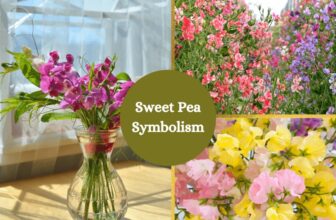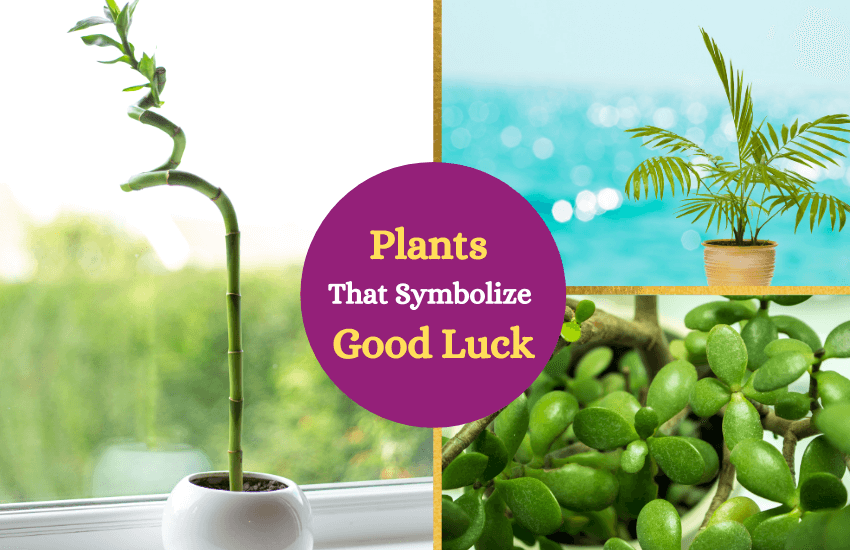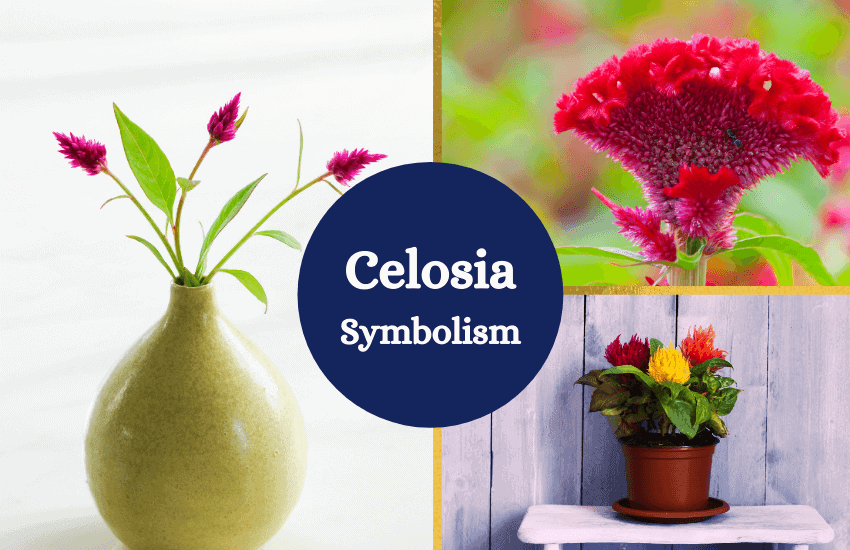
Table of Contents
A very unusual flower in shape and texture, celosia takes the spotlight in gardens from summer to fall. You can recognize them from their feathery, plume-like blooms and sometimes coral-like flowers, but celosia comes in several different shapes. Here’s what you need to know about celosia, it’s most popular varieties, along with its symbolic meanings and practical uses today.
About the Celosia
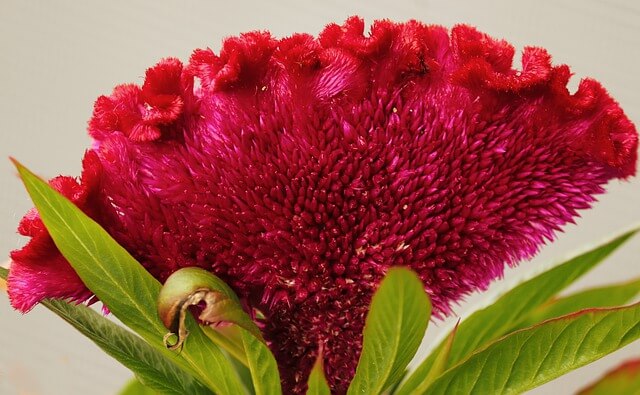
Also called cockscomb because of its resemblance to the crest of a rooster, these are the charming garden flowers from the Celosia genus of the Amaranthaceae family. Its name comes from the Greek term keleos that means burning, referring to the flame-red hues of the flower. As a native to Africa and South America, they love tropical climates and are drought tolerant.
Celosia’s festive appearance makes them a favorite garden ornamental.
- The C. argentea has flower heads that look like blazing flames.
- The C. cristata have a coral-like appearance, reminding us of a rooster’s comb or even an alien’s brain.
- On the other hand, the C. spicata variety has spiky blooms similar to wheat plants and has a pleasant herbal scent.
Celosias are commonly seen in sunset-inspired colors like yellow, orange and red, as well as cream, pink and purple. Their stems also reflect the color of their flowers, and most varieties have green foliage, as well as bronze or burgundy leaves. Different varieties of celosia look beautiful in garden beds and borders, but taller types are usually grown as cut flowers.
- Interesting Fact: These unique blooms will make you look twice, but certain varieties can be eaten too just like spinach! In fact, the Celosia argentea is widely grown as an ornamental food crop. It’s said that their leaves are soft and tasty when the plant is young and turn bitter as it matures. Of all the world’s vegetable crops, celosia is arguably the most colorful and the prettiest!
Meaning and Symbolism of the Celosia Flower
Celosia’s otherworldly flower shapes make them a favorite in the gardens, but do you know they’re associated with various symbolism too? Here are some of them:
- Love and Affection – In some cultures, celosias are believed to have a magical power of love. In western Africa, they’re even referred to as soko yokoto that means the food that makes husband’s face rosy. More than that, the flower blooms from summer to autumn, and remains vibrant even as the season becomes melancholy. Because of that, they have gained the symbol of unfading love.
- Silliness and Foppery – Due to the exotic appearance of the flower, it’s associated with silliness. However, why exactly it’s gained this symbolism is unclear.
- Singularity and Partnership – The flower’s symbolism might be a paradox, but celosia is a standout in any garden, and can also look wonderful with other companion plants.
- Strength and Immortality – They remain strong and beautiful even during storms—just the same way they do in the sunlight. They’re a hardy and resilient plant, which enhances this association.
- Courage – In some contexts, they also represent boldness, making them the perfect bloom to wish someone courage.
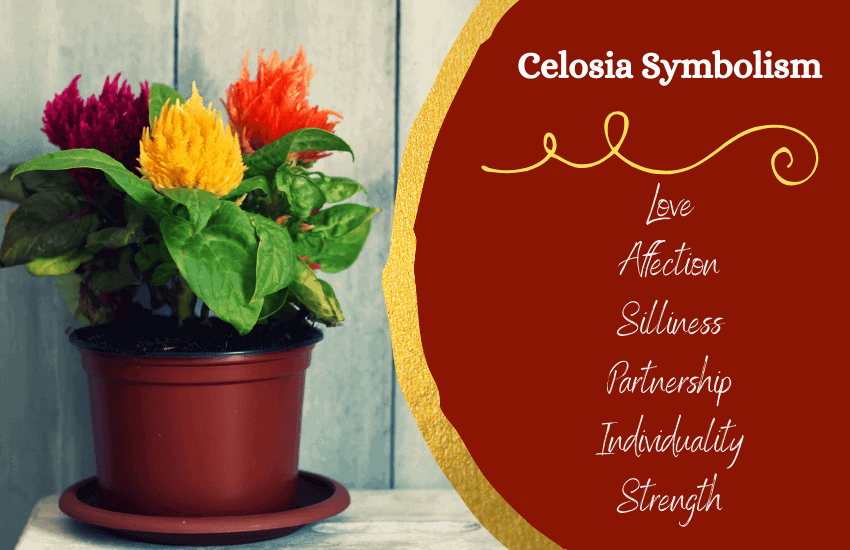
Uses of Celosia Flower Throughout History
Apart from its exotic beauty, the plant has medicinal value too. Did you know Africans cultivated celosia as a vegetable, not as an ornamental? Here’s a look at the many uses of celosia.
1. In Magic and Superstitions
It’s believed that dreaming of celosia is a good omen, especially for pregnant women, as it’s a sign that they’re having a daughter. When a man dreams of the bloom, he’ll likely attract prosperity and abundance. When a single woman dreams of a celosia, she’ll be able to meet her true love.
In Chinese culture, the flower is deeply associated with the symbolism of the rooster, which is an auspicious animal with the power to banish evil spirits. Also, the term rooster rhymes with the term luck, hence the celosia is believed to attract luck.
2. In Religious Ceremonies
In ancient religions, the flame-like flowers of celosia was used in worship, rituals and mourning. Nowadays, many Mexicans use them to decorate church altars, shrines and graves, especially during the Día de los Muertos or Day of the Dead celebrations. It’s said that the colorful hues of the bloom keep the occasion joyous and cheerful.
3. In Medicine
Disclaimer
The plant is valued for its nutritional value, which includes iron, protein, calcium, vitamin A and C, and phosphorous. When eaten, it’s said to have a diuretic effect. Also, its leaves have been used as a poultice for sores and boils while its seeds were used for alleviating diarrhea. Some parts of the plant are also utilized as medicine for treating eye diseases, intestinal worms, mouth sores and even blood diseases.
4. In Gastronomy
Celosia is used as an ingredient in many cuisines around the world. In western Africa, certain varieties of celosia, especially the silver cockscomb, are grown for their leafy greens. In Nigeria, its leaves are incorporated into stews with onions, eggplant, meat or fish, peanut butter and hot pepper.
In Congo and Benin, they’re a popular ingredient in soups and maize porridges. In Indonesia, West Indies and Sri Lanka, varieties of the celosia are regarded as a spinach substitute. Sometimes, they’re even served as a side dish with other dishes.
The Celosia Flower in Use Today
It’s no doubt that celosia is one of the most beautiful flowers you must have in your garden. If you don’t have a backyard space, you can grow them in borders and containers.
Whether you like the plumed type or the crested type, they’ll add visual interest to any bouquet and can last up to a week or two in vases. Once dried, they can be used to create stunning floral decorations at home.
For fall weddings, celosias are a beautiful choice due to their sunset-inspired hues. The funky flower can easily blend with more traditional blooms. They can be the focal point in your centerpieces, as well as a filler flower in your posies. They’re a perfect addition to boutonnieres and wedding cakes too.
When to Give Celosia Flowers
Their vibrant color and unique shapes make celosias the perfect for any gift-giving occasion. For the holidays, think of celosias with feather-like blooms, which look as festive as Christmas tree decorations. In some cultures, they’re the traditional flower given during Labor Day and football parties.
As a symbol of affection and silliness, a bouquet of celosia can be a romantic gift for your special someone, best friend or spouse whom you share lots of love and light-hearted laughs. They’re also ideal for birthday celebrants who like something different.
In Brief
With their striking curly shape, spiky blooms and vibrant colors, celosias will create a dramatic landscape statement. They’re excellent not just in your gardens—but also on your plate as a delicious, healthy meal!





